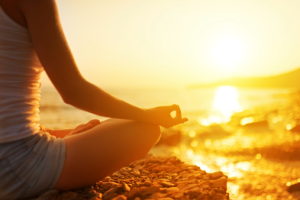Stress and anxiety are natural aspects of human nature that are a part of life. As long as you live, you will experience these two emotions at some point in time. While medication can be very helpful in managing stress and anxiety, there are also alternative ways to reduce your stress and anxiety without taking medications.
Here are 10 non-medicated answers to reducing your stress and anxiety.
1. Meditate On It
 Meditation can be a very powerful tool in alleviating stress and anxiety. Try to find 5-10 minutes, a few times a day, where you can focus on your breathing and try to clear your mind. Studies show that when you are stressed, your breathing becomes shallower, faster, and higher in your chest. By lengthening your breaths and breathing deep in your belly, you can significantly alter your state of mind in that moment.
Meditation can be a very powerful tool in alleviating stress and anxiety. Try to find 5-10 minutes, a few times a day, where you can focus on your breathing and try to clear your mind. Studies show that when you are stressed, your breathing becomes shallower, faster, and higher in your chest. By lengthening your breaths and breathing deep in your belly, you can significantly alter your state of mind in that moment.
2. Get Moving
At the risk of quoting Legally Blonde, exercise gives you endorphins, and endorphins increase your happiness. If you are feeling particularly stressed or anxious, take a 30-minute break and go for a run, walk, or even yoga. Just get moving!
3. Turn on the Music
Sometimes you just need to tune out and turn the tunes up. Music is a well-studied treatment for situational anxiety. By listening to your favorite songs, you can make an immediate impact on your mood.
4. Talk it Out
 Whether you talk about your stress out loud to yourself, or with a close friend or confidant, being able to vocalize your stresses and worries can help relieve it as well as give you a fresh perspective on your situation. Talking really does help and helps the emotional charge release.
Whether you talk about your stress out loud to yourself, or with a close friend or confidant, being able to vocalize your stresses and worries can help relieve it as well as give you a fresh perspective on your situation. Talking really does help and helps the emotional charge release.
5. Eat a Balanced Diet
Getting the nutrients your body needs is another great way to curb stress and anxiety. Make sure you are eating a balanced diet of fruits, veggies, and foods high in omega-3’s. We often forget how much food does effect our mood, so eat healthy and plan ahead if you need to.
6. Don’t Forget to Sleep
Studies find that most Americans are not getting enough sleep. This can cause great stress to the body. Sleep helps return your body’s systems back to normal and keeps everything working properly. Additionally, even naps can help reduce cortisol levels, which are instrumental in causing stress and anxiety. In order to help you get a better nights sleep, create a routine or ritual. Drink a soothing cup of tea, listen to calming music, light a candle or even do some light reading before you go to sleep. Another helpful tip is to get on a sleeping schedule. Waking up and going to bed at the same time each day even on the weekends and vacations can help you reduce stress and get the sleep you need to reduce anxiety and stress.
7. Dump the Caffeine
Caffeine may not be your friend in times of stress as it increases adrenaline, the very hormone you are wanting to reduce to curb stress and anxiety. Try decaffeinated tea or a coffee alternative such as Dandy Blend.
8. Try Natural Supplements
The types of recommended supplements you should and should not use to treat stress and anxiety will differ from physician to physician. However, a few that most will agree upon that you can try are; fish or krill oil, Vitamin B-12, and Vitamin D. Ask your physician for recommendations on dosages and types before you take any supplements or vitamins.
9. Human Touch

Studies show that physical contact can make all the difference in stressful situations. Hugging is said to reduce blood pressure, while kissing releases chemicals that are known to eliminate stress hormones. So reach out to your loved ones and start hugging or cuddling more.
10. Seek Additional Help
It is OK to admit that you might need a little extra help in your stress management. If your stress and anxiety is starting to interfere with your daily life, it might be time to seek help from a counselor or psychiatrist who is trained in helping you recover from severe or chronic stress and anxiety.
Have some great stress reducing tips that were not mentioned today? Write them in the comment box below, we would love to hear what works for you!
To a happy, stress-free life,
Dr. Amanda Itzkoff

